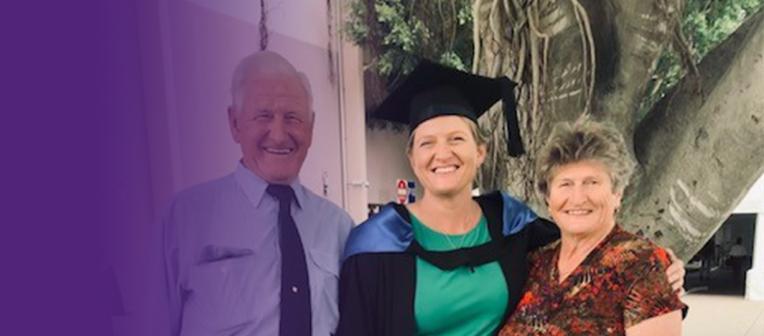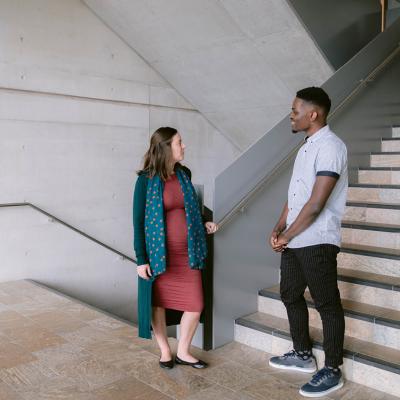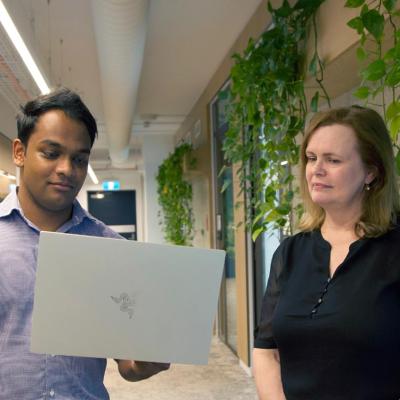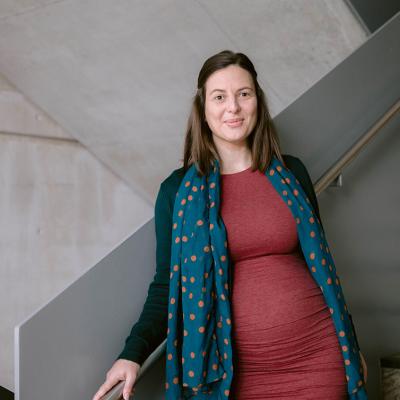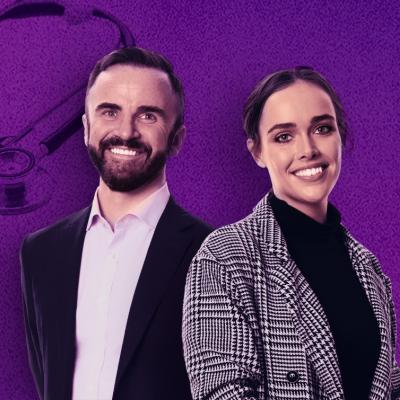Sue Chaffey shares her journey to becoming a Nurse Practitioner – including her experiences studying the Master of Nurse Practitioner at The University of Queensland.
Sue Chaffey is an oncology/haematology nurse practitioner (NP) at the Royal Brisbane and Women’s Hospital (RBWH) in Cancer Services. She’s a highly experienced professional who graduated from nursing over 20 years ago, but she always had a passion for cancer care.
What did your early career look like?
I started as a graduate nurse at the RBWH in Medical Oncology/Radiation in a great team of people who set me up for success in my career. From there, I went to the Princess Alexandra Hospital (PAH) for a few years, where I worked more in haematology, outpatient care and clinics.
I then spent a few years in Bath, UK, which was a fantastic experience and probably what pushed me to want to do something more. It was different to what I was used to, and I found it hard but rewarding to always question what I thought I knew.
"Something I came to appreciate about myself was that I was a really good nurse – too good a nurse to be a doctor (something I joke about). I learnt about myself that, as a nurse, I could deeply care and advocate for a patient, but I still wanted to find that place where I could do more and learn more."
When did you first become interested in becoming a nurse practitioner?
About 5 years ago, I was thinking about – but not really looking for – what I could do next. I was working in clinical trials. The opportunity presented itself through some very supportive colleagues, and I was given the chance to study while working. It was one of those ‘stars aligning’ moments, and I jumped at it.
What was appealing to you about becoming a nurse practitioner?
Like many of us, I went into my master’s program with no guarantee of a job after or even knowing what it would look like. But I knew it was the way forward for me.
I spoke to a number of doctors I had worked with for years, and they were very supportive. I took the leap knowing that time almost always changes everything. The likelihood of things changing over the 2-year NP course were pretty big, and things did change.
Why did you choose to study at UQ?
UQ was a recommendation from a fellow NP. They had completed their studies through UQ and liked the course structure. UQ also has an affiliation with Mater, which is where I worked, so it all seemed to fall into place.
In your mind, what makes a good nurse practitioner?
I’m still very new at this, but when I look around at my fellow NPs, I’m always inspired by their knowledge and passion for what they do.
"I also really admire how they advocate for their role. I think we know what a positive difference we make to health care and patient outcomes, but we are still trying to convince the rest of health care. Sitting in the middle of nursing and medicine creates a perfect storm for debate and definitions."
A good NP needs to navigate this well, while focusing on how they serve their patients. We need to be dedicated to proving this and constantly improving it by being innovative and skilled at bringing people and teams together to get the best out of everyone.

What did you enjoy most about your study?
Hands down, the people I met. I have some fabulous and very valued friends from our 2 years together, and I learnt so much from them. In fact, I still do. They come from all over the country, from different fields, at different points in their careers.
The other thing I enjoyed was learning different things and seeing my profession from a different angle, recognising its potential and having the ability to go after it.
What kind of hands-on training did you undertake during your study?
I think the clinical hours in this program are invaluable. Figuring out how to bridge the gap between nursing and medicine – and find that sweet spot in between – really sets up how you practise as an NP.
This was a huge eye opener for me. In the beginning, I found I had to almost switch off my ‘nursing’ brain and find a medical one. Doctors think very differently to nurses, and it took me a while to figure out how to combine the two. I’m still working on that, honestly.
I was very fortunate to have supportive medical mentors but more fortunate to take an opportunity when COVID first impacted health care.
I recognised where I could help when we had a number of doctors who were isolated at home.
Telehealth became our avenue of being able to support their clinics. I would see the patient in clinic with a video link to the doctor who was at home. I learnt so very much – with the added ability to be a little autonomous as well.
What skills did you pick up while studying the Master of Nurse Practitioner?
Medical assessment, which is very different from nursing. Learning how to systematically and medically assess a patient, draw conclusions from that assessment to drive your actions, then make a diagnosis and prescribe treatment, is a skill.
"It’s one I’m getting better at, but I’m not perfect yet. The key word in there is ‘medically’. It’s also the part that you join with nursing, and the combination is the perfection."
How do you think your experience in the program helped set you up for a successful career?
I had a fabulous 2 years of study. It was disrupted by COVID, but we made this work for us, not against us.
The group of 2020 had a lot of fun and banter over chat groups and Zoom meetings. We’d bounce ideas off each other and share what our work lives looked like. Seeing how others did it, or wanted to do it, was great for me.
We were also very blessed to have a course coordinator who engaged with us and inspired us. He showed us the possibilities of what we could achieve, showed us examples and gave us the confidence to go after that. He was a real person, a real NP. He was doing what we all wanted to do. I am very thankful for his guidance and inspiration, then and now.
What were some of the most memorable courses you encountered?
I have found that our final assessment of designing our conceptual framework is something I have used a lot for building my role now. This really set me up on a path of thinking about how to grow what I do, and it’s important to realise how valuable this is. Every NP does something a little bit different from the next NP; there’s no ‘universal’ NP role. Learning how to make it your own cannot be underestimated.
What do you think the Master of Nurse Practitioner gave you?
I see it as a gradual progression of my skill and ability to care for my patients. I know what I’m passionate about and that I can be good at it, and being an NP makes me able to be the best I can be.
So, if that is your goal and your passion, then yes, aim for being an NP, being the best you can possibly be.
Being an NP doesn’t happen overnight though. It takes time, experience and dedication to what you love – like all good things in life.

